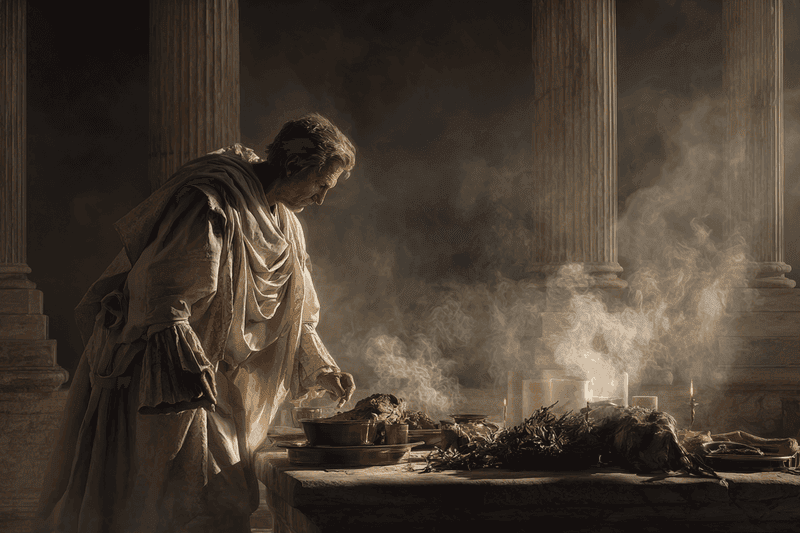People throughout history have turned to superstitions to make sense of a confusing world.
Before science could explain things like illness, weather, or luck, ancient cultures created their own beliefs about how to control fate.
Some of these superstitions seem downright bizarre to us today, but back then, they were taken very seriously and shaped how entire societies lived their daily lives.
1. Reading Animal Guts to See the Future
Ancient Romans had a peculiar way of predicting what would happen next. Special priests called haruspices would sacrifice animals and carefully examine their internal organs, especially the liver.
They believed the shape, color, and condition of these organs held secret messages about future events. Military leaders and politicians would consult these priests before making important decisions.
If the liver looked healthy and normal, it meant good things were coming. But any strange markings or discoloration? That spelled trouble ahead. This practice was so respected that no major decision happened without checking the entrails first.
2. Spitting on Yourself to Avoid Epilepsy
Walking through ancient Rome, you might witness something pretty gross. When someone encountered a person having an epileptic seizure, they would immediately spit on themselves.
Greek philosopher Theophrastus documented this strange behavior. People genuinely feared they could “catch” epilepsy just by being near someone experiencing a seizure, treating it like a contagious disease.
The act of spitting was thought to create a protective barrier against the condition. This superstition shows how little ancient people understood about neurological disorders and how fear drove them to unusual protective rituals that seem ridiculous by today’s medical standards.
3. Sacrificing Redheads for Better Crops
Ancient Egyptians held a dark belief about ensuring good harvests. They thought sacrificing people with red hair to the god Osiris would guarantee abundant crops for the coming season.
After the sacrifice, they would burn the body and scatter the ashes across their fields. This gruesome practice connected red hair with fire and the life-giving sun, which they believed transferred fertility to the soil.
Being a redhead in ancient Egypt could literally be a death sentence during times of poor harvests. Thankfully, this brutal superstition eventually faded as agricultural knowledge improved and such extreme practices became less acceptable.
4. Touching Condemned Criminals for Luck
During Queen Elizabeth’s reign, executions drew massive crowds for more than just morbid curiosity. People actually believed that touching the body of a condemned criminal would bring them incredible good fortune.
Crowds would surge forward after executions, desperate to lay hands on the deceased. Some even paid money for the privilege of touching the corpse or obtaining pieces of the hanging rope.
This belief was so widespread that executioners could make extra income selling access to the bodies. The superstition likely stemmed from ideas about death transferring power or that suffering purified the condemned person’s spirit, making their touch beneficial.
5. Sacred Chickens Predicting Battle Victory
Roman generals carried sacred chickens into battle, but not for food. Before any major military engagement, they would offer cake to these special birds and watch their behavior closely.
If the chickens eagerly ate the cake, victory was assured and the army would march confidently into battle. But if the birds refused to eat, it meant certain defeat awaited them.
One skeptical admiral famously threw the chickens overboard when they wouldn’t eat, declaring if they won’t eat, let them drink. He lost the battle spectacularly, which only reinforced everyone else’s belief in the chicken oracle system for generations afterward.
6. Finding Water with a Forked Stick
Imagine needing to find water without any modern equipment. Ancient African cultures, along with many others worldwide, developed a technique called dowsing or water witching.
A person would hold a forked branch, usually from a willow or hazel tree, and walk slowly across the land. When the stick supposedly detected underground water, it would mysteriously pull downward in the dowser’s hands.
Communities trusted certain individuals who claimed this special ability, and they would dig wells wherever the stick indicated. Despite being practiced for thousands of years and still used by some today, scientific tests have never proven dowsing works better than random chance.
7. Drawing a Witch’s Blood to Stop Her Powers
Medieval Europe lived in constant fear of witchcraft. When misfortune struck a village, people often blamed a local woman they suspected of being a witch.
The solution? Draw her blood. Villagers genuinely believed that making a witch bleed would completely neutralize her magical powers and prevent her from causing further harm.
Sometimes people would scratch suspected witches, while other times they used more violent methods. This superstition contributed to countless acts of violence against innocent women, especially those who were elderly, unmarried, or simply different. The witch trials era showed how dangerous superstitions become when combined with fear and mob mentality.
8. Naming Your Enemy to Transfer Illness
Ancient Egyptians had a creative, if morally questionable, approach to dealing with sickness. When someone fell ill or got injured, family members would start calling them by an enemy’s name instead of their real one.
They believed this name-switching would magically transfer the illness or injury from their loved one to the person they disliked. The logic was that words held power, and by repeatedly using the enemy’s name, they could redirect fate itself.
This practice reveals how ancient people thought about identity and the power of names. It also shows they weren’t above wishing harm on others if it meant protecting their own family members from suffering.
9. Chest Hair Curling Means Future Slavery
Ancient Mesopotamian fortune-tellers claimed they could predict a man’s entire future just by looking at his body. One particularly odd belief involved examining the direction chest hair grew.
If a man’s chest hair curled upward toward his neck, it was considered a terrible omen indicating he would eventually become enslaved. This prediction would have been absolutely terrifying in a time when slavery was common and losing freedom was a real possibility.
People took such omens seriously enough that they might avoid certain business deals or marriages based on these physical signs. Ancient texts carefully documented these body-reading techniques, treating them as legitimate predictive science rather than superstition.
10. Sailors’ Strange Rules at Sea
Life at sea bred countless superstitions among sailors who faced unpredictable dangers daily. Whistling aboard ship was strictly forbidden because sailors believed it would summon violent storms and dangerous winds.
Interestingly, black cats were considered lucky on ships, contrary to land-based superstitions. Sailors also avoided saying certain words like drowned or goodbye, and some refused to set sail on Fridays.
Women aboard ships were thought to anger the sea gods, causing storms. These beliefs gave sailors a sense of control over the uncontrollable ocean. Even experienced captains followed these rules, knowing their superstitious crews might refuse to sail otherwise or blame any disaster on broken traditions.
Lover of good music, reading, astrology and making memories with friends and spreading positive vibes! 🎶✨I aim to inspire others to find meaning and purpose through a deeper understanding of the universe’s energies.











